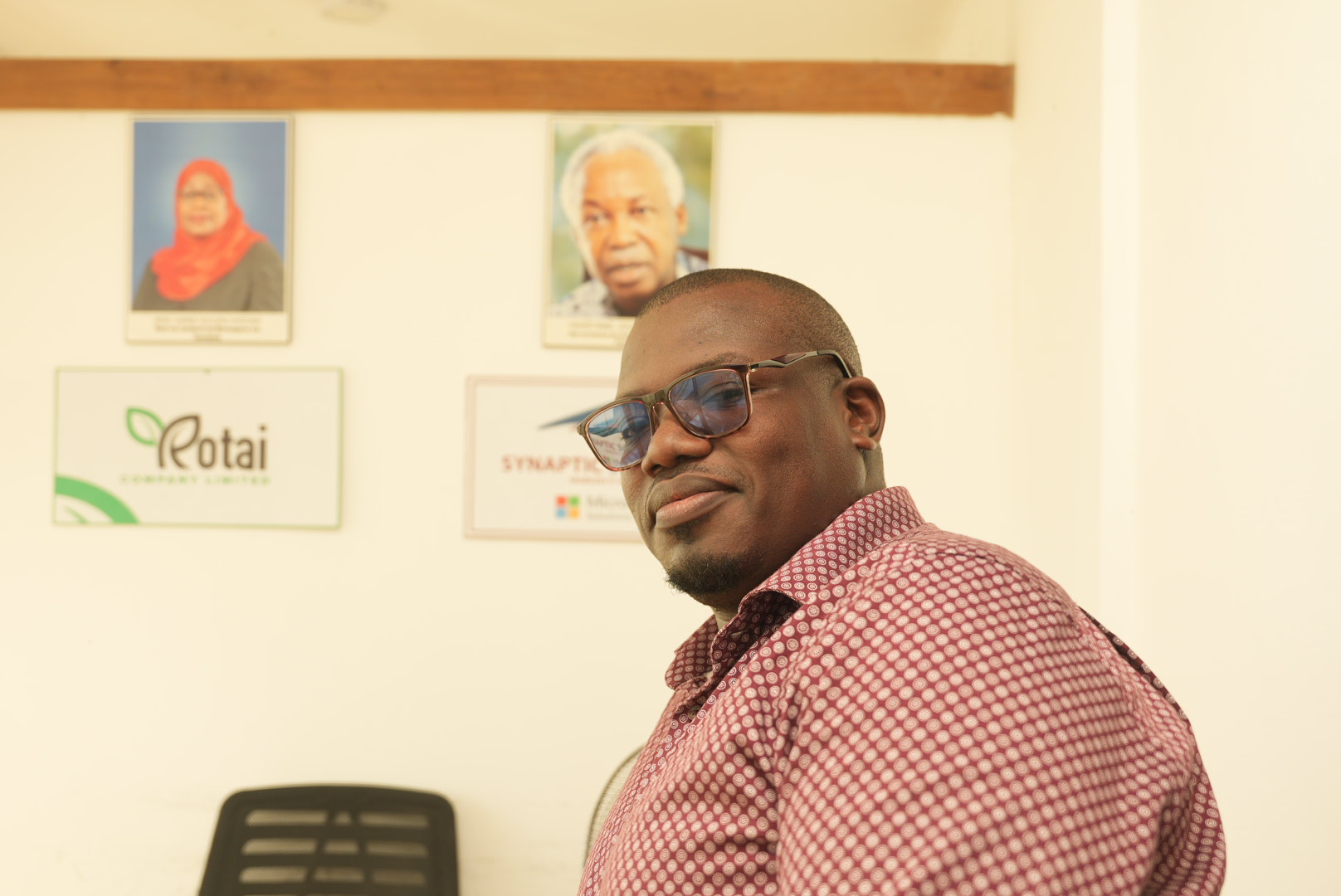Meet Felix Awino, cofounder of Rotai Company LTD
During a recent visit to Tanzania, we visited some of our growth programmes for an extensive interview with their founders about the company, their lives and entrepreneurship in their country.
Working with the Tanzanian government on digital crop aggregation, Rotai Company LTD is making a difference for Tanzanian smallholder farmers. With their custom software, clerks at warehouses are able to capture produce in real time, detailing which and how much produce is brought in across the country. Thanks to this transparency, farmers are receiving fair - and far higher - prices and Tanzania is able to stay competitive in international trade. With 16 employees and around 40 field officers spread throughout the country, Rotai is utilizing the power of data to revolutionise Tanzanian agriculture.

Part 1: the work
Can you tell me a bit more about Rotai and your services?
Felix Awino: Rotai is an agricultural technology service provider. We develop systems across the agricultural value chain; one of our core products is a software called MkulimaHub. Mkulima is Swahili for farmer, hub is self-explanatory. MkulimaHub is a digital platform that brings the smallholder farmer into the agricultural ecosystem. A smallholder farmer often has difficulty to access loans. Our platform uses alternative scoring methods to help that farmer have access to finance.
The platform also does what we call access to markets, because we’ve digitized the aggregation centers where the produce is brought in. The platform removes the human interaction so that there’s traceability and transparency in that weight collection process. We register farmers based on where they take their produces. In most occasions in Tanzania, we have agricultural marketing cooperative societies or AMCOs, where a farmer should go with their produce. We digitized the cooperative societies at a village level. Once farmers go there and their produce is weighed, our work continues with several government agencies. Firstly the regulator of the cooperative societies, where our platform pulls the data from - because they’ve profiled their farmers. The platform cannot weigh if you’re not registered, but the clerk at that particular center can always register you. Once that is done, the collected data is relayed to the warehouse regulatory seat board - this government agency checks the quality standards of the produces. Do they meet the threshold of international trade? After this - if it gets a green light - it goes to the final government agency, called the Tanzanian Mercantile Exchange. This is the national commodity exchange platform for auctioning or online purchases.
We have linked MkulimaHub with payment solutions, with banks and most preferably because we’re dealing with smallholder farmers, we’ve linked them with mobile money systems. So once the produces are sold online, that data is relayed back to our platform, then our platform develops what we call a farmer payroll based on prices. These prices are not static, but based on the market that day. That is how the AMCOs now use the mobile money network to pay the farmers; they receive their money through their mobile wallet. You realize that now you have a track history of an individual farmer in terms of yields and in terms of transaction history. With this alternative credit score method, mobile network operators can now give microloans to these farmers. That is what Rotai does. We started in the year 2020 with two people, my partner Joash Mutai, who is the CEO, and myself, the chief operations officer. We’re still a young company, but determined to grow

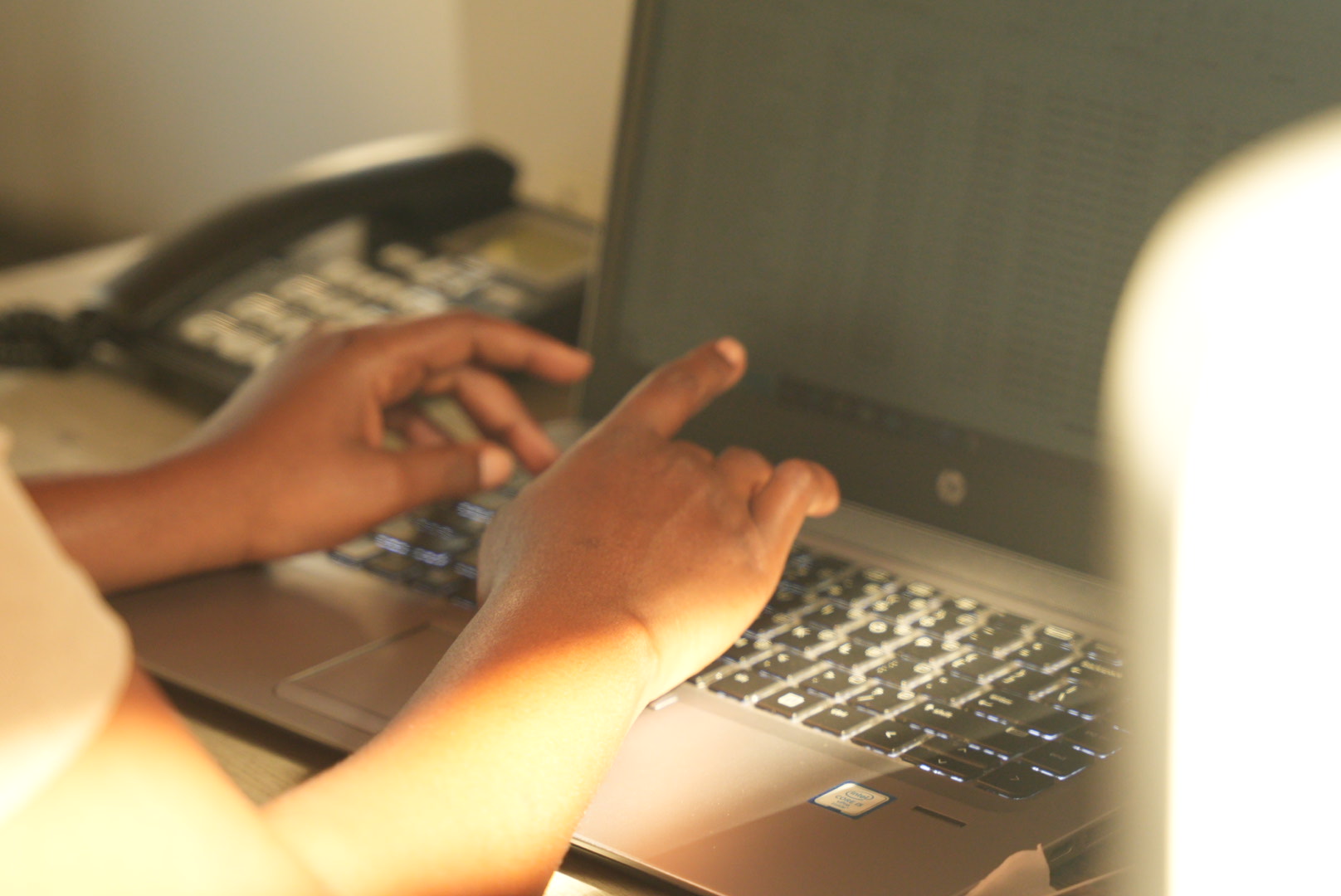
Why did you choose this sector? Especially in combination with IT?
Felix: My partner Joash worked for an agricultural software company that did software. However, most of the platforms in the agricultural space did not suit the market. There are little gaps. We saw that gap and started to customize. I'm a marketeer by trade, my job is business development and marketing. We teamed up and developed a platform that could speak the farmer’s language, a platform in swahili. It's easy to use - one training is enough. If you don’t understand Swahili, it has an option to change the language to English, but we’re also working on other languages. As young as this company is, big government agencies saw that we had filled that gap and partnered with us. They lacked real time data, and that is what we provide. To know where the farmers are, what they produce, in what volume, ... can the minister of agriculture go to sleep knowing that today we have weighed this much coffee in Tanzania?
Even for the farmers it becomes easier. Once they have traceability and transparency in the weight capturing process, they will fetch higher premiums. In an online auction, the highest bidder takes it. When you sell at a farm, and I’ll come and say ‘my friend, I’ll buy your produce at 600 chillings’, you won’t refuse, because you need the money. But at the auction, there is no one-on-one with the buyer. Whatever the farmer was getting, right now he’s being paid double or even triple.
In the four years Rotai exists, what are you most proud of?
Felix: The fact that we actually improved the livelihoods of the smallholder farmers. These smallholder farmers are our mothers, our fathers, our brothers, our sisters. I’m proud of what I have created. You see, the term farmer comes with a 'low reputation', but we are proud to be changing that. It’s no longer low end, it’s high paying. That’s why we have coordinated partnerships with international organisations to create jobs in the farming industry through the platform. The clerks that are aggregating tools are young people who will not have thought of agriculture at one particular time. They’ve gotten employed because of a solution that has been deployed to help smallholder farmers. This, we are very proud of. And the fact that even our government trusts the process, is a big achievement for us.
What are your ambitions and long term goals for the company?
Felix: We’re looking to scale. Our proof of concept has worked in Tanzania and we’ve done our surveys and studies: there’s not much like what we’re doing happening within our neighbouring countries, except maybe for the Kenyan tea industry. We're looking to be the go-to agritech solution in the East African region and most probably in the Central African region as well. We believe in data integrity. There is a lot of data out there, real time and purely digital. There's no human touch, so you’re actually sure that it is data you can work with or on. We’re looking to be that particular solution provider, providing integrity to agricultural data.
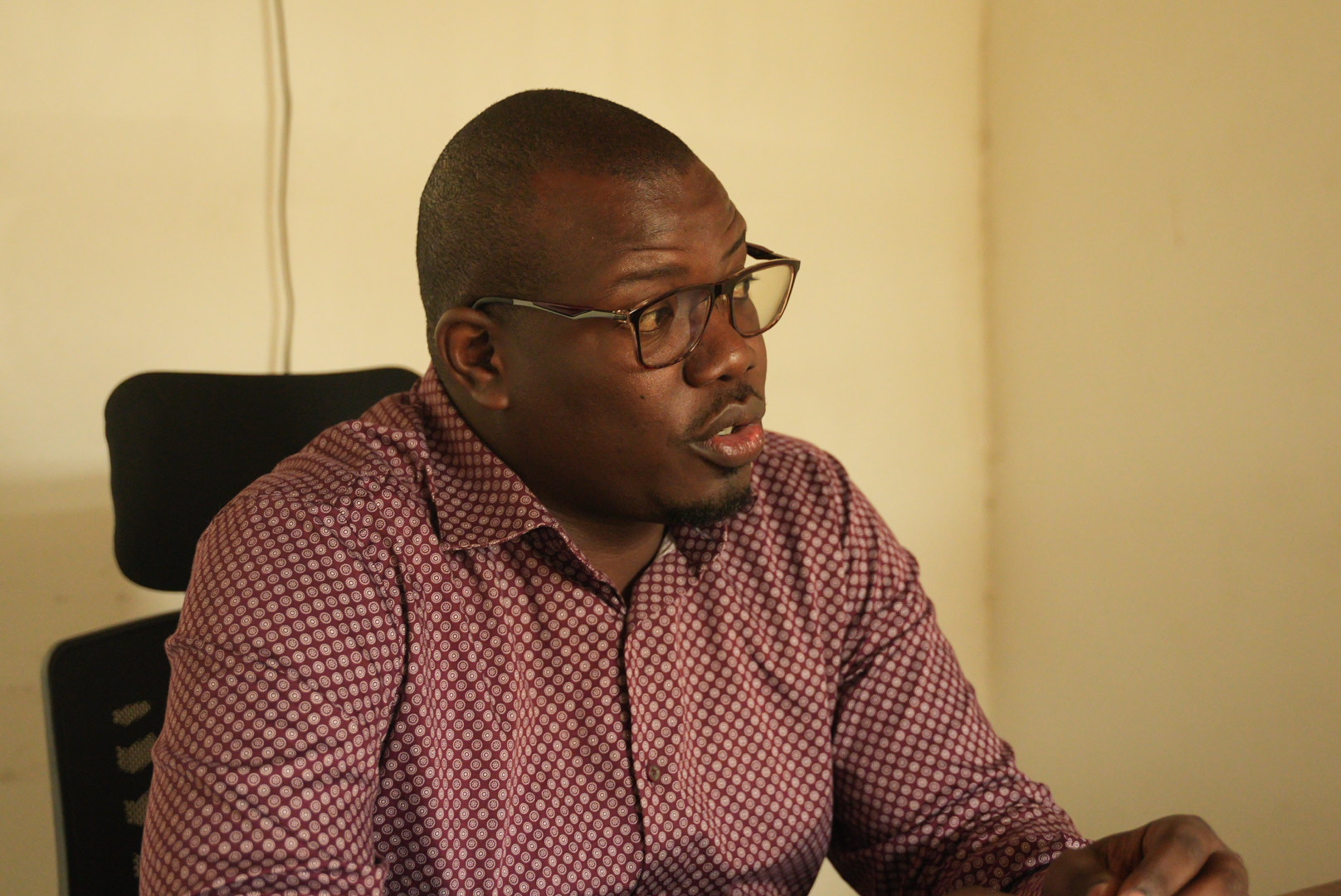
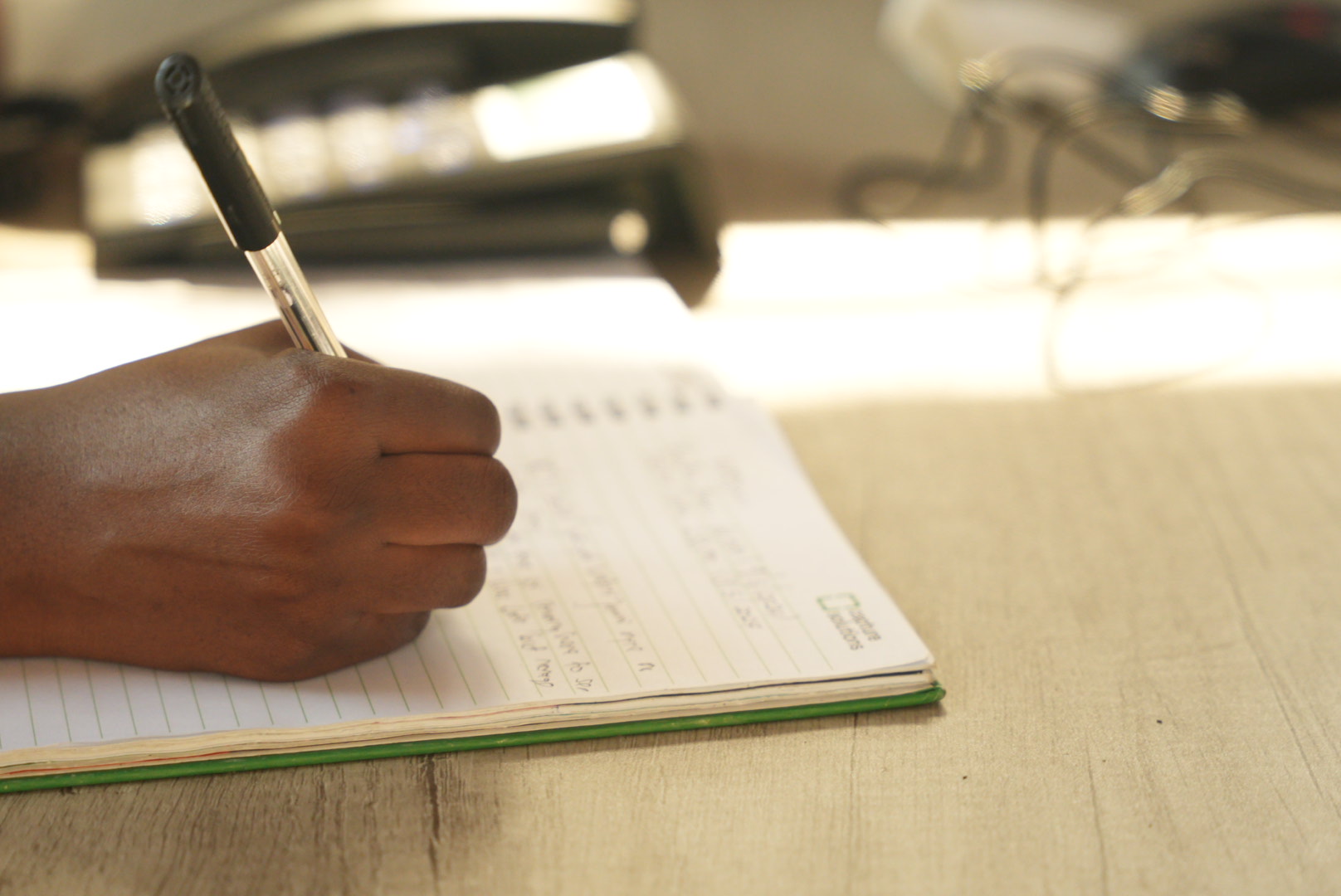
Part 2: life and Exchange
Can you tell me a bit more about yourself? What inspires you?
Felix: Apart from an entrepreneur, I am a family man. Not just a family man, but also a father of girls. If you have girls, you need to work extra hard. It inspires you: you look at them and want the best for them to grow up. In many projects that we’re working on, there’s a lot of goodwill invested towards empowering the women. If you’re creating employment, 60% should be female, so you can imagine from a household perspective we should implement that too. Being a family man keeps me going. Again, I grew an interest in smallholder farmers and the wish that a smallholder farmer is proud to actually access things that they thought was for large scale farmers, like access to mechanisation, simply because you brought a platform that can bring them together and they can pool their resources together and afford those kinds of services. I look at this and see that this is good, because this will go a long way to improve the livelihoods of these smallholder farmers. If you go out there right now and see the way they’re celebrating the premium prices they are fetching compared to the previous years, you’ll take a step back and feel wowed. This is a revolution. That keeps us going.
What do you like to do in your free time?
Felix: I watch a lot of movies; I love them. I grew up in a family that were purely artists. One of my parents was a comedian, the other a singer. So you can imagine when I got home, my dad would crack jokes, everyone would laugh. He was like the storyteller of the village. We would go to functions and they wouldn’t even need to hire an MC - a master of ceremony - they told my father ‘you are here’. That is the kind of family I grew up in. Looking at it, we grew up as artists. Myself, I was on the stage performing from my primary school until university. My elder brother is a talented singer who will be performing at the Olympics this year. My free time entails a lot of creativity. I love singing, I love acting. And most of all, I love movies because they open up your mind. Apart from that, it's very important for me to spend time socializing with friends.
What has your experience with Exchange been like?
We started engaging with Exchange sometime last year. From what we have gathered, Exchange is bound to bring in technical expertise in terms of how we can scale up the business. Because if you look at it, we’re still young people, a young company. We don’t know everything and we really need some strategic involvement in terms of business expansion. We still have a lot of gaps. We're running the business as founders, so at times you get carried away and don’t look at things strategically. That is where we believe Exchange will come in handy; through that process I believe we are creating a better Rotai.

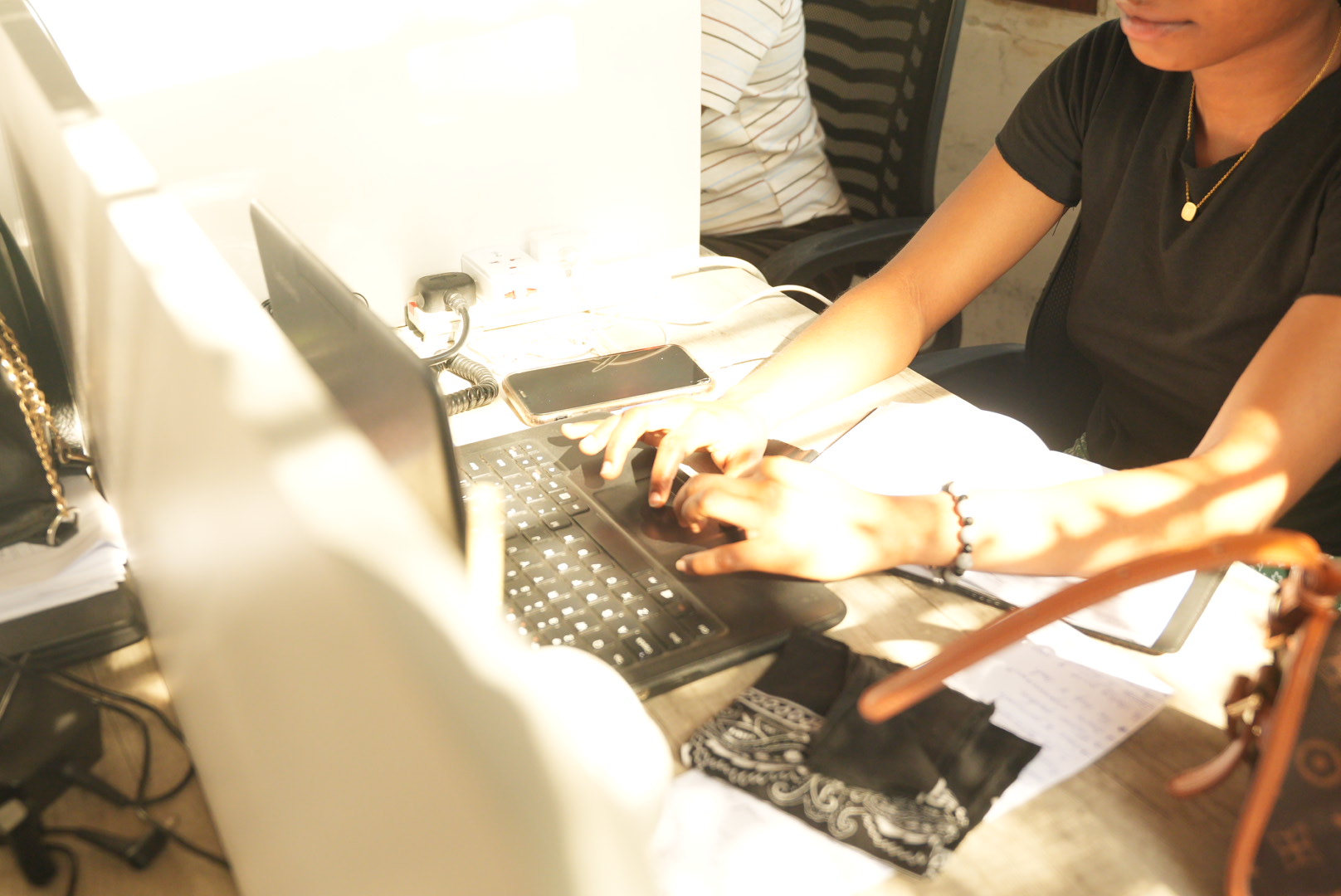
Part 3: entrepreneurship and Tanzania
How do you look at the business climate and entrepreneurship in your country?
Felix: Tanzania is quickly growing and already the second largest economy in East-Africa. If you look at its development rate, it’s moving so fast and catching up to Kenya. Kenya has been far ahead of us in terms of funding for startups, seed capitals,... but Tanzania, receiving almost a quarter of what Kenya received in terms of funding, is doing well. The business environment led by our president doctor Samia Suluhu Hassan is pleasant for any person who wants to do business. We are a small, young, private entity, working with government institutions - we could not have imagined this. The environment is friendly and good for growth, and like I said, we are quickly catching up. With its agricultural sector, Tanzania has the potential to be the food basket that feeds the world. We in the agricultural space want to live up to that and say: we are committed to advancing as far as this country can to become the food basket of the world.
What improvements do you look forward to the most in the next few years?
Felix: There’s a lot in the digital space that has not been aligned with the government's policies. The world is moving towards the technological space and we need to know how to align these policies correctly. I am hopeful: the agricultural ministry is proactive, we have a young minister, and so many things are being tabled in parliament so as to improve the space. This year alone, the ministry of agriculture was allocated almost twice the budget of last year, that tells you where the priorities are. There's a lot of establishments to facilitate startups as well. And from a private sector perspective, there’s a lot of public, private engagement, which is a good thing and which is what we’re looking forward to. I will say that we are heading in the right direction and in the next coming years, we will actually get there.
What do you like most about your country?
Felix: What I like most about Tanzania is the social nature of the people. You know when they tell you Karibu Tanzania? That is Tanzania. You are a brother’s keeper, and that social culture was instilled by the late founding father of the nation, Julius Nyerere, to an extent that your friend is your brother. We live in a country where that social embracement of how we treat people, how people are regarded, is top notch. I’ve been to several other countries, but Tanzania is exceptional in that particular aspect. That, to me, is what I love. If you sleep hungry in Tanzania, it is you who is wanting to sleep hungry. With the kind of social networks and social culture that has been instilled in this nation, you will never allow your neighbour to go hungry while you have it, which is different in other parts of the world.
